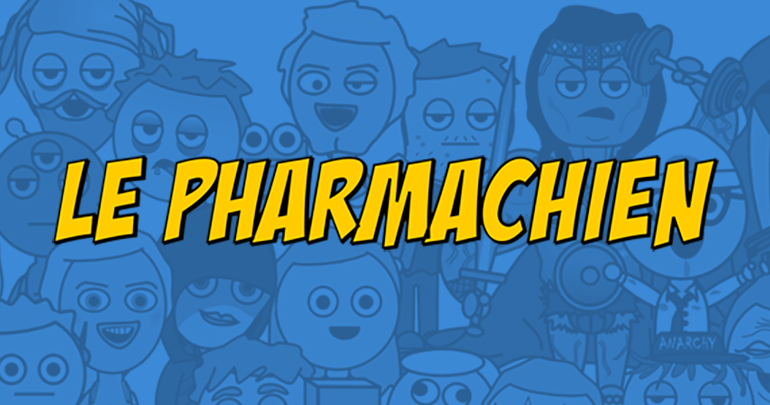An investigation by the McGill Office for Science and Society reveals that 2/3 of pharmacies in Montreal sell oscillococcinum, a homeopathic product more diluted than the equivalent of an atom in an entire Universe filled with water:

https://mcgill.ca/oss/article/health-quackery/two-thirds-montreal-pharmacies-sell-quack-flu-buster
Are you surprised?
I’m not.
Back in Sept. 2012, when I started Le Pharmachien (the original French version of The Pharmafist), my first post ever was a sarcastic video about homeopathy, and about how absurd it is that we sell these products.
Since then, not much has changed. We still use the same fake arguments to justify ourselves.
“IT’S POPULAR, CLIENTS ASK FOR IT, AND THEY’RE SATISFIED!”
What difference does it make if it’s popular or not? Healthcare and science are not popularity contests.
If people want to buy homeopathy, fine. But our role as pharmacists is to provide advice and care based on scientific evidence. When homeopathic products are sold in pharmacies, it gives the false impression that we endorse them.
Interestingly, most pharmacists don’t trust homeopathic products at all… but are stuck with them on the shelves. It’s a problem.
“AT LEAST THERE’S NO RISK!”
Not true. If people neglect to seek medical care because they trust homeopathy, it’s extremely hazardous.
There are tons of examples, but here’s one from Canada :

“IT’S A GOOD PLACEBO!”
ALL healthcare interventions generate a placebo effect: medications, surgeries, exams, talking to patients… These interventions are supported by scientific evidence, and have a placebo effect as a BONUS.
Meanwhile, homeopathic products are 100% placebo, but pretend otherwise on their labeling and are sold at ridiculously high price tags. How is that acceptable?
Also, by opposition to what most people think, from a pharmacy owner’s perspective, it’s not “money-related”; margins are low and associated profits are negligible (in my experience, 80-90% of profits in a typical pharmacy come from prescription drugs). Who’s making money, then? Manufacturers.
…
At the end of the day, those who could really make a difference blame each other and make bad excuses in an endless cycle. This graph summarizes the situation:

Will someone ever take responsibility for the problem?
Let’s be clear: Health Canada will not stop approving these products. Some countries have set limits, but none has officially banned them. So we have to stop waiting for them to make a move.
In my opinion, the simplest solution is that a pharmacy chain takes a stand and announces that it will no longer sell homeopathic products. With a bit of luck, others will eventually follow.
So, who will be first?
P.S. Oh by the way, I’d like to salute the Quebec Order of Pharmacists, who stated, in response to the McGill investigation, that a pharmacist who recommends homeopathy by claiming that it is effective would “place oneself in a situation of disciplinary misconduct”. BOOM!












I agree with all your arguments entirely – however, I think there is a « social health care system dilemma » here – no tax payer funded social healthcare system should pay for unproven products like homeopathic products – it is simply unethical – however, allowing a whole lot of relatively rich (data shows it is the richer and « better educated » that go for homeopathic products) healthy, middle class people to have buy these products as their placebo fix, reduces pressure on health systems generally, as they « self treat » mild conditions which is maybe a good management plan for reducing burden on state health systems 😉 – Nevertheless I agree it is dangerous when people use this nonsense over proven treatments.
Thank you very much for your insightful comment !
With regards to:
« reduces pressure on health systems generally, as they « self treat » mild conditions which is maybe a good management plan for reducing burden on state health systems »
The way I see it is: placebo effects are easy to come by. A simple verbal interaction with a reassuring, empathetic healthcare practitioner may even be more effective than homeopathy overall. We’re not very good at this, unfortunately, but I would choose this over an overpriced, fake treatment anytime.
I also think it’s a question of ethics and honesty. If homeopathy was free, and if we didn’t have to lie about it, sure. But right now, we’re allowing a billion-dollar industry to actively mislead the public into believing into their treatment, which most of the time are about mild condition indeed, but sometimes are not (ex. homeopathic nosodes used to prevent infectious diseases). Homeopathy and homeopaths are at the forefront of the anti-science and anti-medicine movement. And so far we’ve done an excellent job of letting them do their thing without intervention, comforting ourselves with the idea that a placebo won’t hurt most people.
So altogether, I am not convinced at all that homeopathy can reduce the burden on the healthcare system. I am actually considering the opposite. But I’d be willing to reconsider if there was solid data on such an idea.
Thanks again !
Olivier